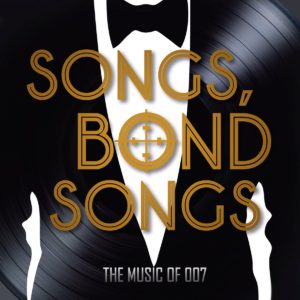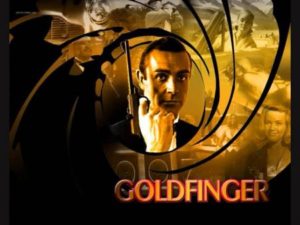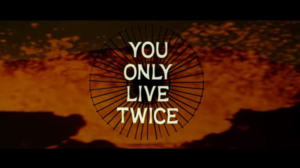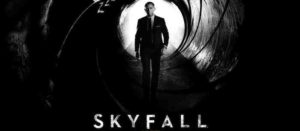 Record label Curry Cuts has released three well-received collections of classic-pop tracks, two of which focused on era-specific anthologies. The first found artists recasting ’70s Lite Rock in different ways. The second featured an appreciation of hits from the 1980s by British bands.
Record label Curry Cuts has released three well-received collections of classic-pop tracks, two of which focused on era-specific anthologies. The first found artists recasting ’70s Lite Rock in different ways. The second featured an appreciation of hits from the 1980s by British bands.
The fourth Curry Cuts effort, presented by executive producer Andrew Curry, throws the formula for a curve. Songs, Bond Songs: The Music of 007 takes the most famous series of movie themes in cinema history and gives a whole other crowd a shot at reinterpretation. Like who? Like Mike Viola, Freedy Johnston, Jay Gonzalez (Drive-By Truckers), Joe Seiders (The New Pornographers), Chris Collingwood’s Look Park (Fountains of Wayne), Jaret Reddick (Bowling For Soup) Durga McBroom (Um…Pink Floyd, hello!), L.A. power-pop stalwart Robbie Rist, and many more.
The Kickstarter for Songs, Bond Songs: The Music of 007 is now underway at: https://www.kickstarter.com/projects/444321026/songs-bond-songs-the-music-of-007 Popdose sat down with Curry to find out how this collection came to be, and whether any blood was shed over who wound up with “Live and Let Die.”
Where did the idea for this compilation come from…had it been considered for a while?
This is the third multi-artist compilation I’ve done. The first two paid tribute to genres of music that were a big part of my childhood: The soft rock that was so big on Top 40 radio in the mid-to-late 70s, and the British invasion that dominated the early days of MTV. And as fun as those records were to put together, I understood that choosing another couple dozen songs from a different five-year span of music history was inherently limiting. So I started from a similar angle — important music from my youth — but I tried to expand the time frame that was being explored.
James Bond was a big deal to me when I was a kid, and so many of the Bond songs from my childhood were big hits. So that became the jumping-off point. I could still hit those songs I remember growing up, while casting a net that included songs from six decades of music, rather than five or six years.
 There are a lot of interesting names appearing on the compilation, although few might know immediately from the credits list as presented. Who are we looking at here?
There are a lot of interesting names appearing on the compilation, although few might know immediately from the credits list as presented. Who are we looking at here?
That’s a good point! It’s such a great roster of musicians, and so many of the names speak for themselves, like Mike Viola or Freedy Johnston. But a few of the contributors are pretty well known for other work they’ve done, too. For example, Jay Gonzalez puts out terrific solo records that sound like they’re right out of 1977 AM radio. But he’s also a full-time member of Drive-By Truckers, one of the hottest Americana acts of the last decade. Joe Seiders records his own material as Big-Box Store. But his day job is as the drummer for The New Pornographers. Chris Collingwood is the singer and songwriter of Look Park. But for two decades, he played the same role in Fountains of Wayne. Jaret Reddick is contributing to Bond Songs as a solo artist, but he’s spent the better part of twenty years as the front man for Bowling For Soup. Durga McBroom toured with Pink Floyd for years, and had a Top Five hit in England with her own band, Blue Pearl. And pop culture aficionados will all remember Robbie Rist as Cousin Oliver from The Brady Bunch or as the voice of Michelangelo in the first batch of Teenage Mutant Ninja Turtles movies. But he’s a renowned musician in the Los Angeles pop scene, too, and he’s contributing to Bond songs with his latest band, Ballzy Tomorrow.
Bond songs are a tough animal. How did the artist-to-song assignment process come together without everyone going into the Thunderdome for “Live and Let Die” and “Goldfinger”?
I had my worries about that. I knew there would probably be a few songs that people would naturally gravitate towards. The most popular one — by a large margin — was ”Nobody Does It Better” from The Spy Who Loved Me (originally sung by Carly Simon). I’m guessing that fully half of the musicians asked about that one. But what I discovered pretty quickly was that most folks had more than a couple of Bond songs that they loved. So if they couldn’t do ”Nobody Does It Better,” they were happy to give, say, ”Diamonds Are Forever” a go.
In other cases, I was the one with a firm idea of which artist I wanted doing which track. Before a single song had been assigned, my wife said to me, ”Freedy Johnston MUST do For Your Eyes Only.’ Make that happen.” So I became obsessed with the idea. Luckily he said yes, or I don’t know what I would have done. Joe Seiders has fashioned a terrific side project as Big-Box Store by covering songs originally made famous by women. I knew Madonna’s ”Die Another Day,” with its overuse of AutoTune and its silly asides about Sigmund Freud, was going to be a tough sell for a lot of the artists. But after I suggested it for him, Joe took to it right away. And he stripped the song of all its excesses and did what I feared was impossible: He made me genuinely like the song.
 So there are the songs that immediately jump to mind, including the two I just mentioned, and “Nobody Does It Better,” “For Your Eyes Only,” “A View To A Kill” — but then there are the songs that probably should be known better. I’m particularly a fan of A-ha’s “The Living Daylights” and John Barry’s theme for “You Only Live Twice” which — I believe — was sung by Nancy Sinatra. How did you pair up these songs and artists?
So there are the songs that immediately jump to mind, including the two I just mentioned, and “Nobody Does It Better,” “For Your Eyes Only,” “A View To A Kill” — but then there are the songs that probably should be known better. I’m particularly a fan of A-ha’s “The Living Daylights” and John Barry’s theme for “You Only Live Twice” which — I believe — was sung by Nancy Sinatra. How did you pair up these songs and artists?
As with my previous compilations, I start with a master list that I distribute among the musicians that I want on board. But unlike those records, I have zero wiggle room on Bond Songs. On my tribute to the Second British Invasion, if a musician wanted to do a different Tears For Fears song than the one I had on my list, I could easily make that adjustment. No big deal. But if someone decides they don’t want to do ”Goldfinger,” I can’t just say, ”Well, okay. We just won’t have Goldfinger’ on this record.” And that’s happened, more than once: A musician takes on a song, only to discover that it’s not the right one for them or their style. And I have to start over. It’s been one of the complications on this project that I hadn’t anticipated when I started, which seems so ridiculous to me now.
But to get back to the question, I mostly did a ”first come, first served” approach to the song assignments, though I made a few specific requests that I really felt strongly about (Freedy Johnston, Phil Ajjarapu, Lisa Mychols, to name three). And in the case of Robbie Rist, he was insistent that he get to do ”whatever song no one else wants.” He enjoyed the challenge of taking on a song that had otherwise stumped people.
This is one of those deep history questions. The theme for Thunderball was originally supposed to be “Mister Kiss Kiss Bang Bang,” sung by Dionne Warwick. It was supposed to follow stylistically with Shirley Bassey’s “Goldfinger.” But one of the film’s producers, either Albert Broccoli or Harry Saltzman, objected saying that the theme is a valuable marketing tool, and not having the movie name as the title is wasting a form of advertising. So Tom Jones was pressed into service to sing “Thunderball” which ends up being a lesser-known Bond theme in the grand scheme. The pairing process for this particular track has to be carefully done, because if it isn’t handled with a sense of knowingness (if not a sense of humor, per se), it is likely to fall apart. Was this one of the tougher tracks to “cast”?
Did you know that Johnny Cash submitted a track for that film, too? Johnny Effing Cash! Called it ”Thunderball” and everything. And I think it’s pretty terrific. But stylistically, it’s not at all what you’d think of when you imagine a Bond song, so I get why they didn’t end up using it.
This is how I approached that particular song, and it is a true (and very short) story: ”I want to hear Bowling For Soup cover a Tom Jones song.” I had worked with Jaret Reddick on my last compilation, when he was in his side band, People On Vacation. So I reached out to him to see if Bowling For Soup was interested and/or available to do ”Thunderball.” Ultimately, we couldn’t make it work as a full BFS track, but Jaret was game to try it on his own.
 For all the original songwriters involved, getting the brief of writing one of these songs is daunting. You have to make a unique tune but it also must be sufficiently Bond-like to fit. Much as there are Bond gadgets and Bond girls, there’s a specific tonality to a Bond song. As executive producer, what was your brief to the folks covering these tracks when they came aboard? Was it free-reign on their reinterpretations or were they already pretty familiar with the rules, as it were?
For all the original songwriters involved, getting the brief of writing one of these songs is daunting. You have to make a unique tune but it also must be sufficiently Bond-like to fit. Much as there are Bond gadgets and Bond girls, there’s a specific tonality to a Bond song. As executive producer, what was your brief to the folks covering these tracks when they came aboard? Was it free-reign on their reinterpretations or were they already pretty familiar with the rules, as it were?
https://soundcloud.com/amc8051/james-bond-theme-lannie-flowers
I’m steadfast in my refusal to give a musician advice on how to approach a song. I figure I’m not a musician, so who am I to tell them what to do or how to sound? And so I’ve had songs on past records that were close enough to the original that they fooled Shazam into thinking they WERE the original. And then I’ve had reinterpretations that were so far afield from the source material that you’d have to look at the liner notes to know what song you were hearing. That’s part of the fun of these things. And so, while there’s definitely a ”Bond song vibe,” so to speak, I’m not married to any particular sound when it comes to re-interpreting a tune. So when Jay Gonzalez decides to do ”A View To A Kill” as a bossa nova track, I’m delighted. When Robbie Rist turns ”Another Way To Die” into an vaguely industrial song, I’m thrilled. When The Corner Laughers do ”Diamonds Are Forever” in Italian, I’m giddy. Though I’m equally excited when someone does a straightforward cover. I’ve always thought a healthy mix of styles is what makes these kinds of projects work.
Who broke the rules the most?
Well, that implies there were rules! So I’ll just answer a different question. Who surprised me the most? Zach Jones was an artist whose work I only discovered a short time before he came on board, and I had no personal relationship with him before he signed on to the project. I loved his original stuff, but I didn’t have a particular idea of what I might expect from his submission. ”All Time High” was a minor hit from Octopussy, originally sung by Rita Coolidge, but I’m not sure anyone ranks it among the greatest of Bond songs. But Zach’s version just destroyed me — in the very best way — the first time I heard it. Zach didn’t alter the melody at all, but his take is soulful in all the ways the original wasn’t. There are so many great songs on this record, so many offbeat interpretations, so many gorgeously re-imagined takes, but in terms of hitting me in a way I just wasn’t prepared for, I think Zach may take the prize.
What reinterpretation surprised you — in a positive way — the most? Which tune made you sit up and think, “I never thought of it that way”?
Freedy Johnston took what is essentially a corny 80s ballad in ”For Your Eyes Only” and turned it into a song that would fit comfortably on his classic album, Can You Fly. He took a song by Sheena Easton of all people, and he turned it into a damn good Freedy Johnston song. It broke my heart the first time I heard it. The person singing those words sounds world-weary, burdened by the hardships he’s endured. That’s just not something that a 21-year-old Sheena Easton could ever convey. (Not that the Bond production team would have wanted her to.)
How long is the Kickstarter campaign up for and what are some of the perks that are available for funders?
The Kickstarter runs through April 13. There’s some cool stuff available, in addition to getting the record or a t-shirt (both of which you can get, of course). There’s a vinyl copy of The New Pornographers’ brand new record, signed by the entire band. A couple of the musicians are offering house concerts. There are chances to get merchandise from lots of the participating artists. There are signed lyric sheets.
The one package that I’m most excited about right now is the ”Rejected Bond Songs” EP that I’m offering. As we discussed earlier, there are songs that were submitted to producers that, for whatever reason, didn’t end up making it into the films. So Blondie, despite being one of the biggest bands in the world in 1981, has their ”For Your Eyes Only” rejected in favor of Sheena Easton. Radiohead’s ”Spectre” is passed over so that producers can use Sam Smith’s ”Writing’s On The Wall” instead. We already talked about Johnny Cash’s ”Thunderball.” People might be surprised by the big names and strong songs that were passed over, so I thought it would be fun to record a handful of those tracks, and offer them to Kickstarter backers. It’s going to be a fun supplement to the compilation.
Thanks to Andrew Curry for sitting down with Popdose to discuss this new project. You can find out more at the Kickstarter campaign page: Songs, Bond Songs: The Music of 007 https://www.kickstarter.com/projects/444321026/songs-bond-songs-the-music-of-007





Comments